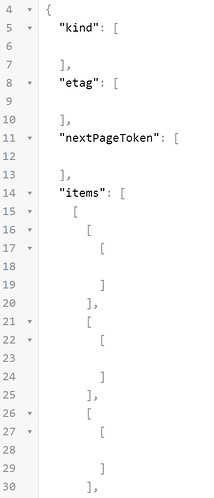Sebastian,
I had to port my .net 5 react spa over to .net 6 due to some architecture requirements. I can’t seem to do services.AddMvc().AddNewtonsoftJson(); like I used to in .net 5. Most of my proxy Web API controllers are returning JSON properly, however I am seeing one controller endpoint (a YouTube Proxy) return JSON with a bunch of empty arrays. I think this is because if a Serialization error from System.Text.Json. I’m aware of some of the issues here, but was wondering off hand if you had any suggestions for migrating to .net 6 since Newtonsoft is necessary.
API Client:
public async Task<dynamic> GetYouTubeVideos(string YouTubeApiKey, string PlaylistId, int Limit)
{
using (var client = new HttpClient())
{
var url = string.Format($"https://youtube.googleapis.com/youtube/v3/playlistItems?key={YouTubeApiKey}&playlistId={PlaylistId}&part=snippet,id&maxResults={Limit}");
try
{
var req = new HttpRequestMessage(HttpMethod.Get, url);
var result = client.SendAsync(req).Result;
result.EnsureSuccessStatusCode();
var ytRes = await result.Content.ReadAsStringAsync();
var output = JsonConvert.DeserializeObject<dynamic>(ytRes);
return output;
}
catch (Exception ex)
{
return new { ErrorMessage = ex.Message };
}
}
return new { ErrorMessage = "No result from YT API" };
}
API Controller
[HttpGet]
[Route("YouTubePlaylist/{PlaylistId}/{Count}")]
public async Task<JsonResult> GetPlaylistVideos(string PlaylistId, int Count)
{
var cacheKey = string.Concat(CacheKeys.Videos.ToString(), ".", PlaylistId, ".", Count);
//Check cache
if (_cacheEnabled)
{
var videos = string.Empty;
_memoryCache.TryGetValue<string>(cacheKey, out videos);
if (!string.IsNullOrEmpty(videos))
{
//return cached version
var videosFromCache = JsonSerializer.Deserialize<dynamic>(videos);
return new JsonResult(videosFromCache);
}
}
//Not cached, cache it!
var apiKey = _config.GetValue<string>("YouTube.APIKey");
var videosResult = await _apiClient.GetYouTubeVideos(apiKey, PlaylistId, Count < 50 ? Count : 50);
_utilities.SetCache(cacheKey, JsonSerializer.Serialize(videosResult));
return new JsonResult(videosResult);
}